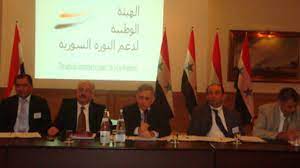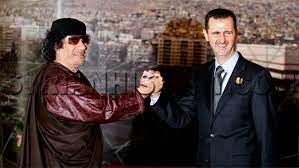In a press statement issued by Khaddam’s office, he directly accuses Rifaat al-Assad of the responsibility for the massacres in Hama and Palmyra and for the violations and abuses committed during his time in power.
“I was not surprised, and neither were many who listened to or read what was said in his speech at a conference attended by members of his family and some of his associates, which was held in Paris. His statements in some television channels did not come as a surprise either because the essence of what he said reflects one of the diseases that Rifaat al-Assad is afflicted with, which is delusion and fabrication, especially in terms of evading responsibility for all the actions he committed and was involved in. Among these crimes are the massacres of Hama and Palmyra. He describes himself as an ordinary officer in the army and claims that he had no involvement in everything that happened in Syria, while shifting the responsibility for these crimes onto his brother and others.”
“Undoubtedly, the policy of isolation, exclusion, and discrimination that the regime relied on has created an atmosphere of sectarian tension in the country due to depriving the overwhelming majority of Syrians of their basic rights and giving free rein to individuals like Rifaat al-Assad and others to commit some of the most brutal acts and engage in all forms of corruption.”
The heinous crime committed by an organized officer within the militant vanguards established by Marwan Hadid, who was also a member of the Muslim Brotherhood before committing the crime and later separated from it, further fueled sectarian tensions.
This crime had a negative impact on all Syrians, but its repercussions were most profound on the families of the students of the Artillery School, all of whom were from the Alawite sect. The crime occurred in mid-June 1979 when a school officer killed forty students in one of the classrooms and expelled all students who did not belong to the Alawite sect.
It is worth noting that the regime dealt with this crime in an unwise manner, drawing attention to Islamic movements, including the Muslim Brotherhood.
As a result of these circumstances, the Muslim Brotherhood was pursued in the country, leading to clashes with them. One of the outcomes of this confrontation was the Hama massacre carried out by this regime, which further exacerbated sectarian tensions. There were other possible solutions to end the sit-in of the Muslim Brotherhood in Hama.
Rifaat al-Assad played a crucial role in the Hama massacre, and the 569th Brigade, led by him, was one of the first military units to enter Hama and commit the crimes that many have spoken about in that brave city.
Rifaat al-Assad claims that he did not visit the city of Hama and that only hundreds of soldiers from the unit he led went to Hama on orders from the military leadership. I would like to clarify the following:
First: There is no truth to Rifaat al-Assad’s claim that the leadership formed two committees, one military and the other political, consisting of Hafez al-Assad, Abdul-Halim Khaddam, the Prime Minister, and the Minister of Interior. In reality, only a narrow military group closely connected to Hafez al-Assad, including Rifaat, managed the battle in all its security and political dimensions. No political committee was formed to manage the political aspects of the battle. Members of the Qatar leadership, Baathists, and members of the National Front usually received information from the streets, originating mainly from Hama. They also received leaks from military personnel. The Qatari leadership was not aware of the Hama massacre until the government requested an additional budget for the city’s reconstruction.
Second: The military leadership that participated in the fighting with the Defense Brigades received its instructions from the army’s leadership. They stormed Hama as one of the army’s units, and I no longer recall their specific unit name. Their direct connection was with Hafez al-Assad and the military leadership. Information regarding the developments of the events reached the army’s leadership. In any case, the names of those involved in the killings will be determined when a committee is formed after the fall of the regime to investigate the Hama massacre, its causes, and its consequences. This massacre is one of the major crimes that occurred in Syria during this period and should not be overlooked as it constitutes a stain on the Syrian people’s history.
Third: Another genocide crime, the Tadmur Prison massacre, committed by Unit 569 led by Rifaat al-Assad. Its officers did not obey any orders unless they came directly from Rifaat or Hafez al-Assad. On the day of the crime, Hafez al-Assad was in the hospital, and several members of the Qatari leadership were present. He did not give any instructions to any military authority because he was preoccupied with his injury and concerned about an assassination attempt.
More than a thousand innocent prisoners were killed in that crime, and none of them had attempted to assassinate anyone because the one who attempted the assassination was a recruit in the Presidential Guard. The file of this crime must also be opened.
Fourth: Rifaat al-Assad claimed that he was just an ordinary officer in the army and, in a television interview, stated that he had always been an opposition figure, left the country, and had no wealth. He further claimed that his children worked with the money he allegedly received from Syrian bourgeoisie. This is a lie that no sane person can believe. Some members of the Syrian bourgeoisie did give him money when he was in power to secure deals with the state.
Rifaat al-Assad did not actually exercise military leadership professionally. Instead, he used his leadership of Unit 569 to dominate and control the state, using its institutions to amass wealth. He effectively continued to lead the unit even after being appointed as the head of the Higher Education Office.
Rifaat al-Assad claims that he was never invited to meetings of the Qatari leadership. How then did he serve as the head of higher education, and how did he accuse several generals, including General Ali Duba, General Shafiq Fayadh, and General Ibrahim Safi, of conspiring in one of the leadership meetings, demanding their expulsion from the party? This was due to their support for his brother during the period when he attempted to stage a coup and seize power.
When his brother Hafez decided to exile him from the country, he received a sum of $400 million from the state treasury, $300 million of which was a loan from Libya that was later repaid.
Rifaat al-Assad also claims to have been a permanent opposition figure. However, can opposition be reconciled with his position as the head of the Council of Ministers at that time and his ability to secure deals for his friends among the Syrian bourgeoisie?
Rifaat al-Assad says he was an opposition figure and the head of the Higher Education Office. How could he have attempted a coup against his brother while Hafez was in the hospital recovering from a heart attack?
In a television interview, Rifaat claimed that both the army and the people wanted him as the president of the republic because, as he said, the president should be a member of the Assad family. Can any rational person believe in such a delusion that Rifaat al-Assad is living in?
Abdul-Halim Khaddam


